HYMN V. Indra.
1 O COME ye hither, sit ye down: to Indra sing ye forth, your song,
companions, bringing hymns of praise.
2 To him the richest of the rich, the Lord of treasures excellent,
Indra, with Soma juice outpoured.
3 May he stand by us in our need and in abundance for our wealth:
May he come nigh us with his strength.
4 Whose pair of tawny horses yoked in battles foemen challenge not:
To him, to Indra sing your song.
5 Nigh to the Soma-drinker come, for his enjoyment, these pure drops,
The Somas mingled with the curd.
6 Thou, grown at once to perfect strength, wast born to drink the Soma juice,
Strong Indra, for preëminence.
7 O Indra, lover of the song, may these quick Somas enter thee:
May they bring bliss to thee the Sage.
8 Our chants of praise have strengthened thee, O Śatakratu, and our lauds
So strengthen thee the songs we sing.
9 Indra, whose succour never fails, accept these viands thousandfold,
Wherein all manly powers abide.
10 O Indra, thou who lovest song, let no man hurt our bodies, keep
Slaughter far from us, for thou canst.
Exploring the Mighty Indra: A Divine Ode
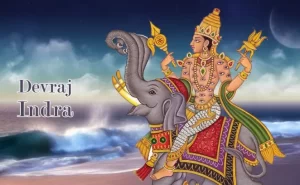
In the realm of ancient Hindu scriptures, there exists a hymn that resonates through the corridors of time, invoking the majestic presence of the mighty Indra. In this sacred chant, we delve into the profound verses of Rig Veda, Book 1, Hymn V, as translated by Ralph T.H. Griffith in 1896. Prepare to embark on a journey through the poetic marvels of yore, as we unravel the essence of this celestial ode to the Lord of treasures, Indra.
Indra’s Resplendent Throne
Verse 1: O COME ye hither, sit ye down: to Indra sing ye forth, your song, companions, bringing hymns of praise.
As we commence our sacred hymn, we are beckoned to draw near, to gather in unity, and to raise our voices in praise of Indra. The call to “sit ye down” evokes a sense of reverence, urging us to make ourselves ready for the divine encounter that awaits.
Verse 2: To him the richest of the rich, the Lord of treasures excellent, Indra, with Soma juice outpoured.
Indra, the Lord of treasures, stands as the embodiment of opulence and prosperity. The offering of Soma juice symbolizes the libation of devotion, a sacred nectar that connects mortals with the divine, showering blessings upon those who invoke it.
The Unassailable Indra
Verse 4: Whose pair of tawny horses yoked in battles foemen challenge not: To him, to Indra sing your song.
Indra’s might is unrivaled, a force that even the fiercest of adversaries dare not challenge. His chariot, drawn by formidable tawny horses, symbolizes his unassailable power. In this verse, we find ourselves impelled to sing, to celebrate his indomitable strength.
Verse 5: Nigh to the Soma-drinker come, for his enjoyment, these pure drops, The Somas mingled with the curd.
The proximity of Soma-drink to Indra signifies our desire to bring him closer to our hearts. The purity of the offering, mingled with the curd, represents the unadulterated devotion we offer, a concoction of spiritual essence to please the divine.
The Ascendant Indra
Verse 6: Thou, grown at once to perfect strength, wast born to drink the Soma juice, Strong Indra, for preëminence.
Indra’s strength is not merely acquired; it is innate and perfect. He is born to partake in the Soma, drawing strength from it, solidifying his preeminence among gods and mortals alike.
Verse 7: O Indra, lover of the song, may these quick Somas enter thee: May they bring bliss to thee the Sage.
Here, Indra is hailed as the connoisseur of song, a being whose soul resonates with the melodies of devotion. The swift Somas are the vessels of joy and elation, meant to please the divine Sage, Indra himself.
The Fortified Indra
Verse 10: O Indra, thou who lovest song, let no man hurt our bodies, keep Slaughter far from us, for thou canst.
As our hymn culminates, we implore Indra’s protection. He is the guardian of our physical being, the sentinel against harm and destruction. With song and supplication, we seek his divine shelter, invoking his benevolence to keep us safe from harm.
In these verses of Rig Veda, Hymn V, we find a profound expression of devotion and reverence for Indra, the Lord of treasures and might. As we conclude this exploration of ancient wisdom, may Indra’s blessings continue to flow, enriching our lives with abundance and protection, just as they have for countless generations before us.
The Mythical Majesty of Indra: King of the Gods
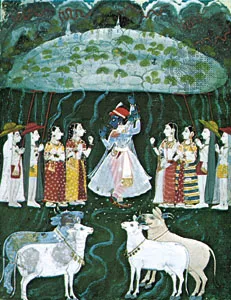
In the intricate tapestry of Hindu mythology, one figure stands tall and resplendent, reigning supreme as the king of the gods. This celestial sovereign is none other than Indra, a deity of unparalleled significance. In this exploration, we delve deep into the essence of Indra, uncovering the rich tapestry of his mythological presence, his multifaceted roles, and his enduring legacy.
The Rigveda and Indo-European Connections
Indra’s roots trace back to the heart of the Rigveda, one of the oldest and most revered texts in Hinduism. Within its verses, he emerges as a central deity, the epitome of divine authority. Remarkably, beyond the boundaries of Hinduism, Indra finds kindred spirits in the pantheons of other Indo-European cultures. He shares his essence with the likes of the Germanic Wotan, Norse Odin, Greek Zeus, and Roman Jupiter, embodying a universal archetypal figure that transcends geographical boundaries.
Roles and Feats
Indra is a deity of boundless versatility, embodying various roles that reflect his multifaceted nature. As the celestial king, he leads his divine cohorts in epic cattle raids against the dasas, or dasyus, the indigenous inhabitants of his dominion. He commands the very forces of nature as the god of thunderbolts, orchestrating the symphony of rain and thunder. Indra is the valiant warrior par excellence, vanquishing formidable foes that range from the asuras to innumerable human and superhuman adversaries.
The Conquest of Vritra: One of his most celebrated exploits is the conquest of the formidable dragon Vritra, a prominent leader of the dasas and a harbinger of drought. Vritra’s transgressions include hoarding the waters and rains, stealing cattle, and obscuring the radiant Sun. Indra’s unwavering resolve to thwart these malevolent deeds leads to a climactic battle of cosmic proportions.
The Elixir of Immortality: Soma
Indra’s unparalleled prowess in these heroic feats is often fortified by the sacred elixir of immortality known as soma. Offered to him in solemn sacrifices by devout priests, soma bestows upon Indra the vitality and strength required to undertake his divine responsibilities. This mystical elixir serves as a potent symbol of his connection to the cosmic order.
Allies in the Heavens
In his celestial court, Indra is not alone. He commands the loyalty of the Rudras, also known as the Maruts, celestial storm deities who ride the clouds and direct tempestuous storms. Together, they ensure the harmonious functioning of the cosmos.
Indra’s Evolution in Later Hinduism
As the sands of time shift, so too does the perception of deities. In later stages of Hinduism, Indra’s role transitions from one of worship to that of a guardian figure. He assumes the mantle of the god of rain, the regent of the heavens, and the guardian of the east. These roles solidify his place in the pantheon, even as the fervor of direct worship diminishes.
Krishna’s Influence: In the grand tapestry of Hindu epics, the Mahabharata, Indra’s paternity is revealed as he fathers the legendary hero Arjuna. In another mythic encounter, he tries in vain to dissuade the god of fire, Agni, from consuming a vast forest.
Krishna’s Challenge: In the Puranas, ancient collections of Hindu myths and legends, the avatar of Vishnu, Krishna, persuades the cowherds to cease their worship of Indra. Enraged, Indra unleashes torrents of rain upon the land. Krishna, however, displays his divine might by lifting Mount Govardhana with a single fingertip, providing shelter for the people for seven days. Indra, humbled, eventually pays homage to Krishna.
Iconography: Riding the Ivory Elephant
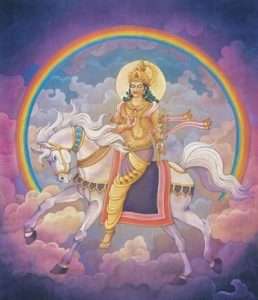
In the world of art and sculpture, Indra is often depicted astride his magnificent white elephant, Airavata. This imagery symbolizes his majestic authority and celestial power, captivating the imagination of artists and devotees alike.
Beyond Hinduism: Indra’s Influence
Indra’s presence is not confined to the realm of Hinduism alone. He extends his influence into the mythologies of Jainism and Buddhism in India, embodying different facets of his character. In Jainism, when Mahavira, the revered savior and reformer, renounces worldly attachments and severs his hair, Indra, as the king of the gods, receives the sacred strands into his divine hands. In Buddhist mythology, Indra’s portrayal varies, sometimes as a figure of mockery and at other times as a symbolic figurehead.
In the grand pantheon of Hindu deities, Indra stands as a luminous exemplar of divinity, his story an intricate tapestry woven through the fabric of time. From epic battles to cosmic conquests, his multifaceted persona resonates across cultures, beckoning us to explore the depths of his mythological majesty.
Do Follow Us On Twitter – https://twitter.com/Uniqverses708
We Have a Wide Range of Unique information For You On Uniqverses.com
Please like, comment & Share if you want us to keep bringing these amazing and unique information for you.




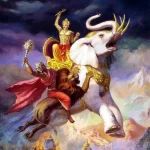
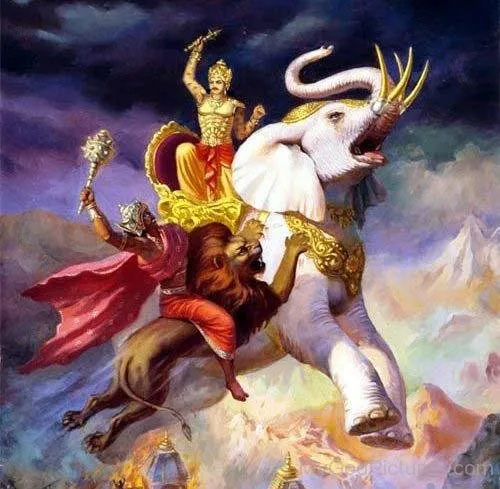
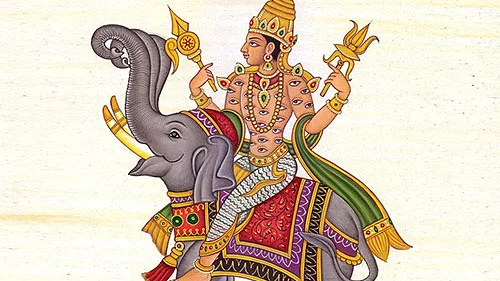
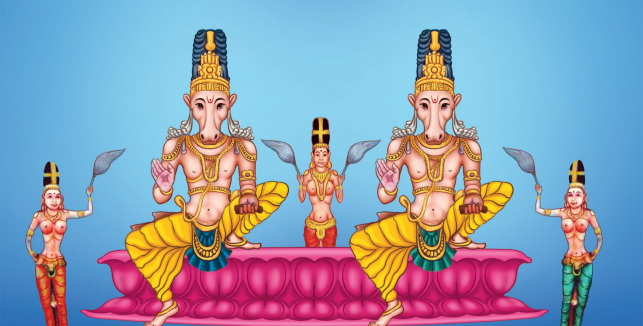
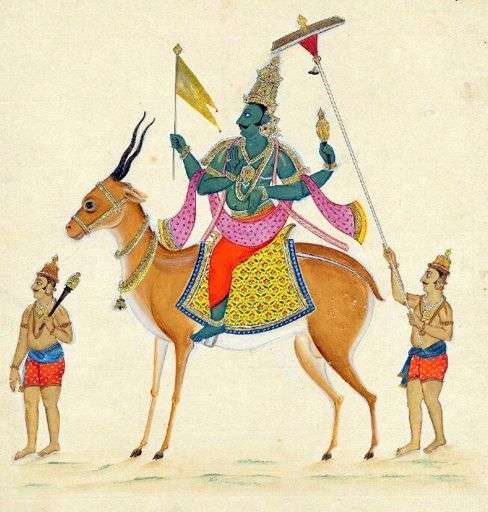
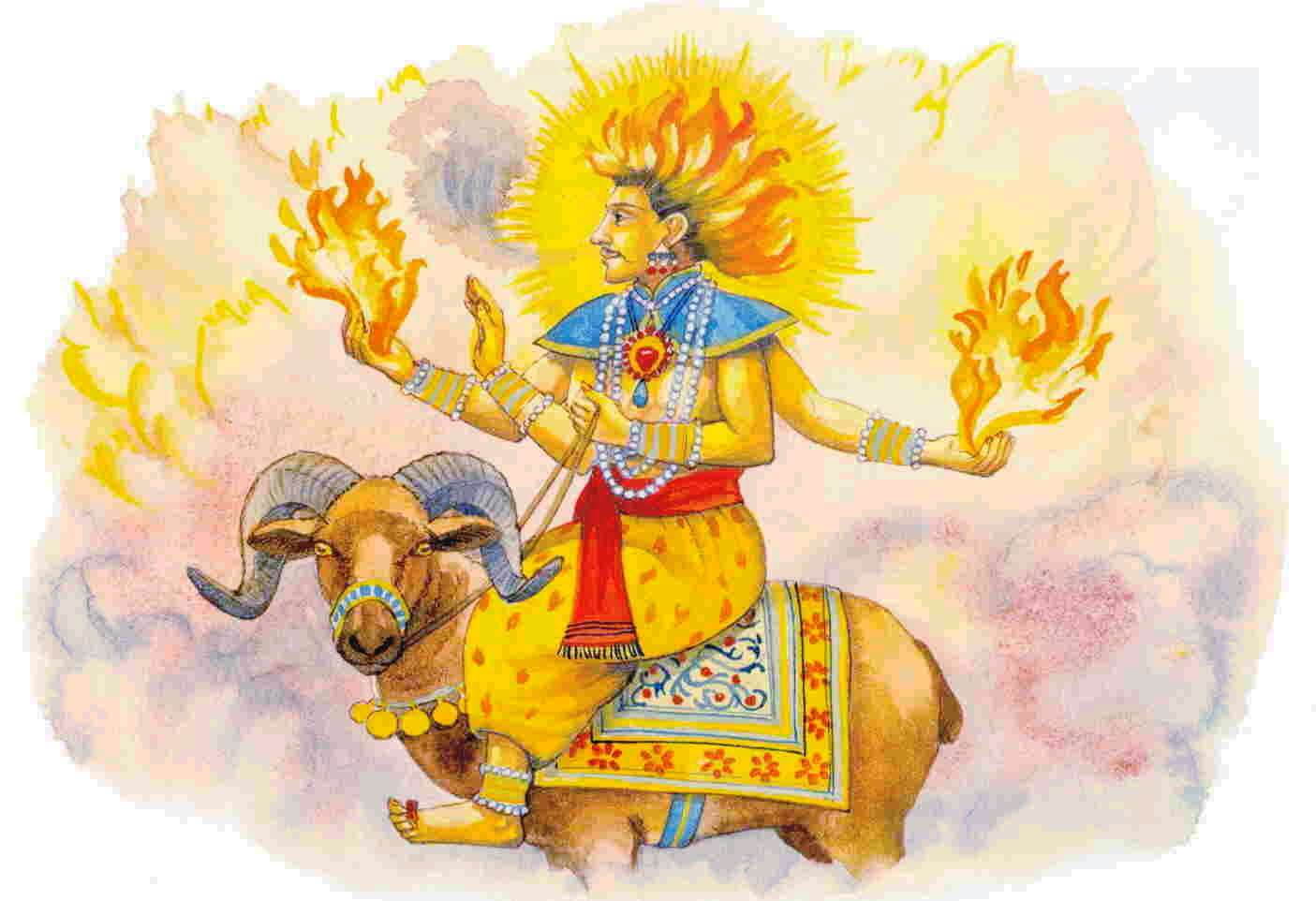
You’re welcome! I appreciate your willingness to engage further. If you have any specific questions or topics you’d like to delve into, feel free to share them. Whether it’s about recent developments in technology, intriguing scientific discoveries, captivating literature, or anything else on your mind, I’m here to provide insights and assistance. Simply let me know how I can help, and I’ll be happy to assist you further!
This website has quickly become my go-to source for [topic]. The content is consistently top-notch, covering diverse angles with clarity and expertise. I’m constantly recommending it to colleagues and friends. Keep inspiring us!